UK survey exposes Brits’ biggest holiday gripes


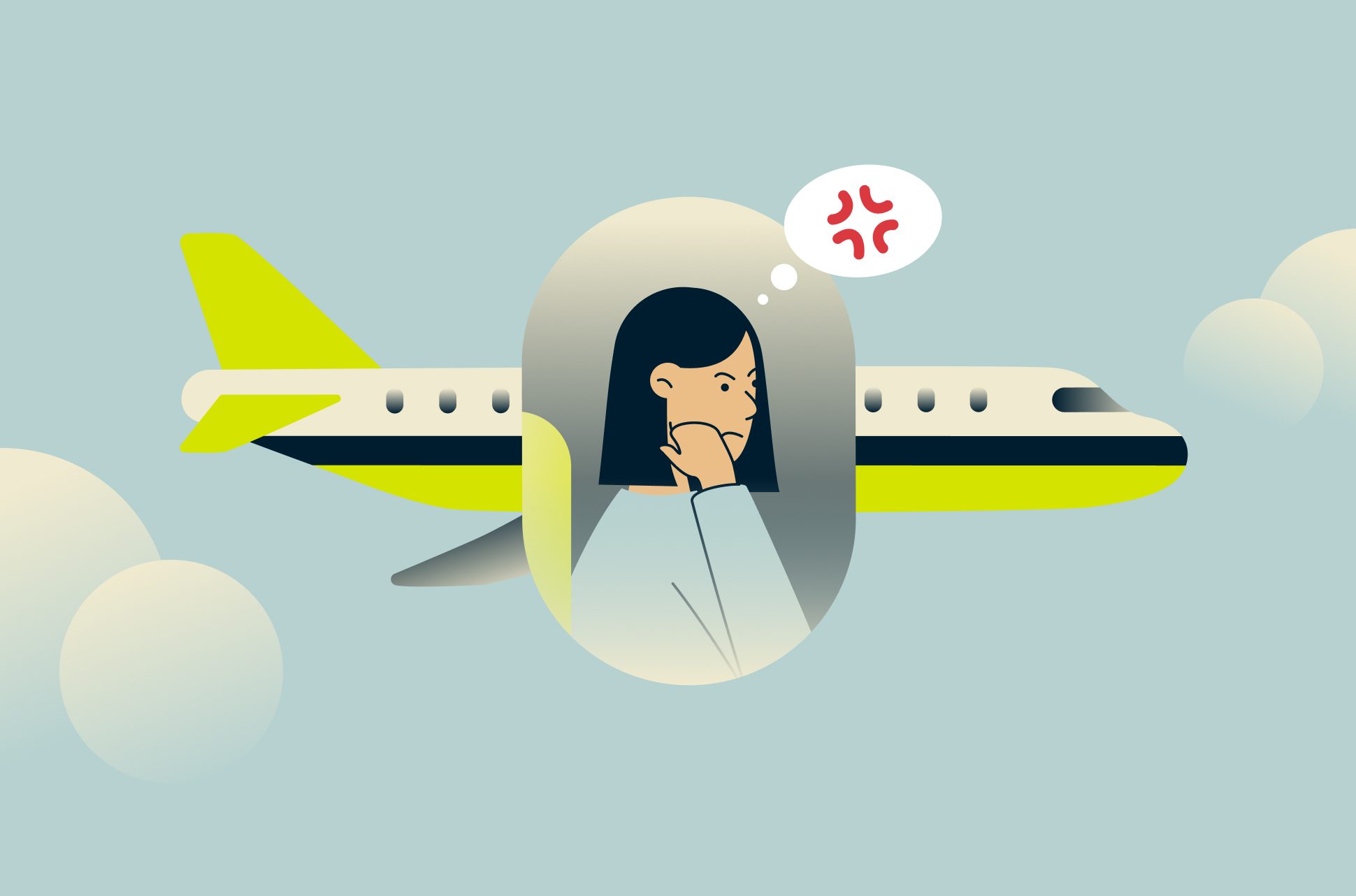
Have you ever sighed at the sight of your holiday budget stretching thin, or groaned as your hotel Wi-Fi fizzled out? You're not alone. In an ExpressVPN survey reaching out to 2,000 Brits, we uncover what really makes or breaks the UK holiday experience: from budgeting battles to the hunt for dependable Wi-Fi, and everything in between.
With 32% of Brits leaning towards staycations to avoid rising costs, budgeting is clearly a priority in holiday planning. However, financial constraints are not the only concern. Safety issues and the search for reliable Wi-Fi loom large, with dirty hotel rooms and delayed flights also ranking high on the list of complaints.
Yet, the need to stay connected never wanes. Despite varying concerns about online security, many of us still log onto public W-Fi to check emails, share holiday snaps, or stream our favorite shows—sometimes overlooking the risks in favor of convenience and connection.
This dive into British travel habits uncovers a mix of cost-consciousness and the constant draw of the digital world. Follow along as we unpack how to tackle these challenges for smoother, safer trips ahead.
Jump to…
The cost of living’s impact on UK holidays
UK travel tensions
Wi-Fi’s role in UK holidaymaking
The dangers of using public Wi-Fi on holiday
The easiest way to stay safe online
Tips for protecting your privacy on holiday
How cost of living impacts UK holidays
As the UK grapples with an unprecedented cost of living surge, British holidaymakers are feeling the pinch. With basics like food and power hitting record prices, the simple joy of a getaway feels more out of reach. This economic squeeze, kicked off by global upheavals and supply chain issues, has nudged a lot of us to rethink our holiday plans, leaning heavily towards staycations as a wallet-friendly move.
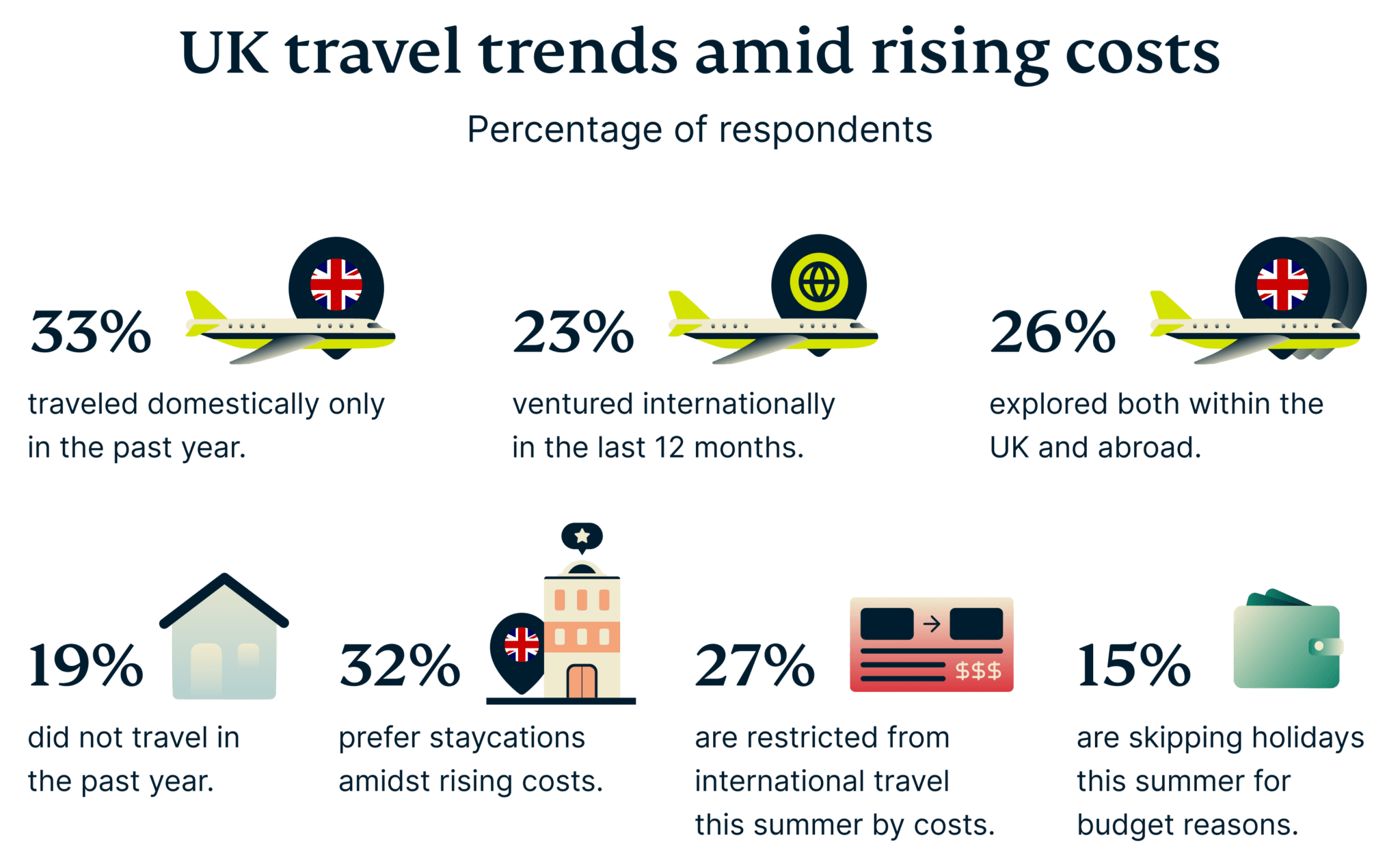
According to our findings, 33% of Brits have traveled domestically in the last 12 months, drawn by the dual appeal of cost savings and local discovery. This tilt towards homegrown holidays is echoed by 32% of respondents who say they consider staycations as a smart move against the backdrop of rising costs.
But it's not all about staying put. While 23% of Brits have recently traveled abroad, a noticeable 27% share that the spike in living costs has clipped their wings for summer travels overseas. Additionally, 19% of Brits say they’ve skipped traveling altogether in the last year, a stark indicator of how deeply financial pressures are cutting into leisure time.
UK travel tensions: From takeoff to check-out
However, for those Brits who do venture out, whether domestically or abroad, it's more than financial constraints that can dampen the holiday spirit. Our findings delve into a range of holiday peeves that often come between British travelers and the good time they're after.
In-flight frustrations
The journey itself is fraught with its own set of irritations. Delayed flights top the list, with 42% of travelers saying it sets a sour tone even before the holiday properly begins. The personal space invasion of seat-kicking neighbors and overly reclined seats frustrates 35% and 30%, respectively, while 28% lament the presence of drunk passengers. Even the basics like legroom and onboard amenities—or the lack thereof—draw irritation from a significant number of British travelers.
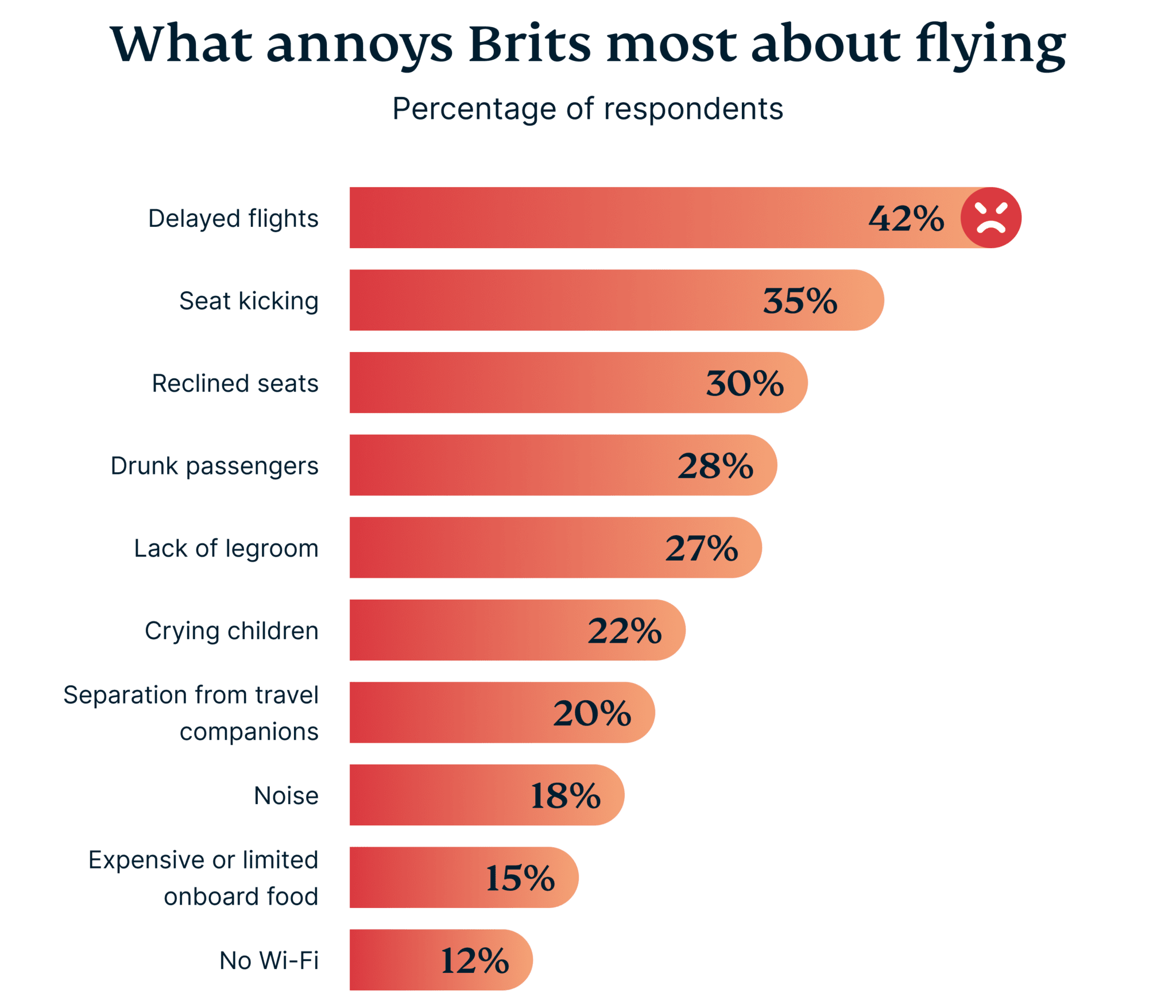
Dirty and unkempt holiday accommodation annoys over 50% of Brits
Upon arrival, accommodation issues can further test traveler patience. A staggering 54% report dissatisfaction with dirty rooms or inadequate housekeeping. The disappointment of poor quality or unhygienic food comes in second, cited by 39%. Noise, unhelpful staff, and the gap between promotional pictures and reality are other common complaints, alongside long transfer times to the hotel, resort, or Airbnb.
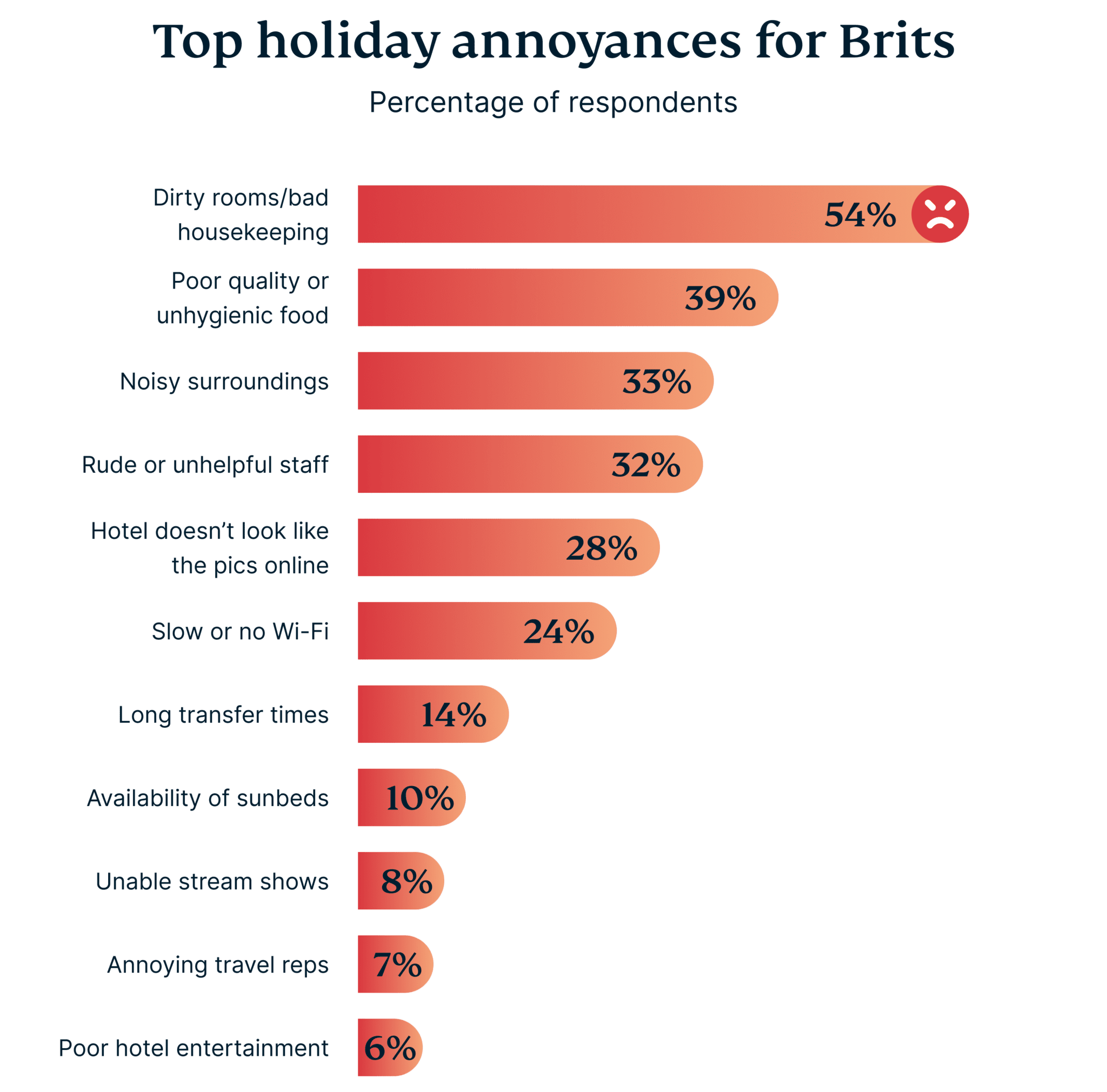
Additionally, 10% get annoyed by fellow holidaymakers hogging sun chairs, especially when they wake up early to reserve their spot. 8% of UK travelers also get irked when they can’t stream their favorite shows while away, while 7% get annoyed by travel reps trying to sell them local excursions, and 6% get irritated when their hotel or resort doesn’t have decent entertainment options like bingo or pool games.
Petty crime and local attitudes rank high as most bothersome destination issues
Despite the exciting prospect of getting to explore new destinations, more annoyances await. According to our respondents, top concerns about the holiday destination itself include the physical security of the area, with 41% of travelers wary of pickpockets and antisocial behavior. Close behind are frustrations with local hospitality, where 37% find locals’ behavior towards tourists less than welcoming. The cost of dining out annoys 34%, highlighting the price sensitivity that extends beyond just booking the trip.
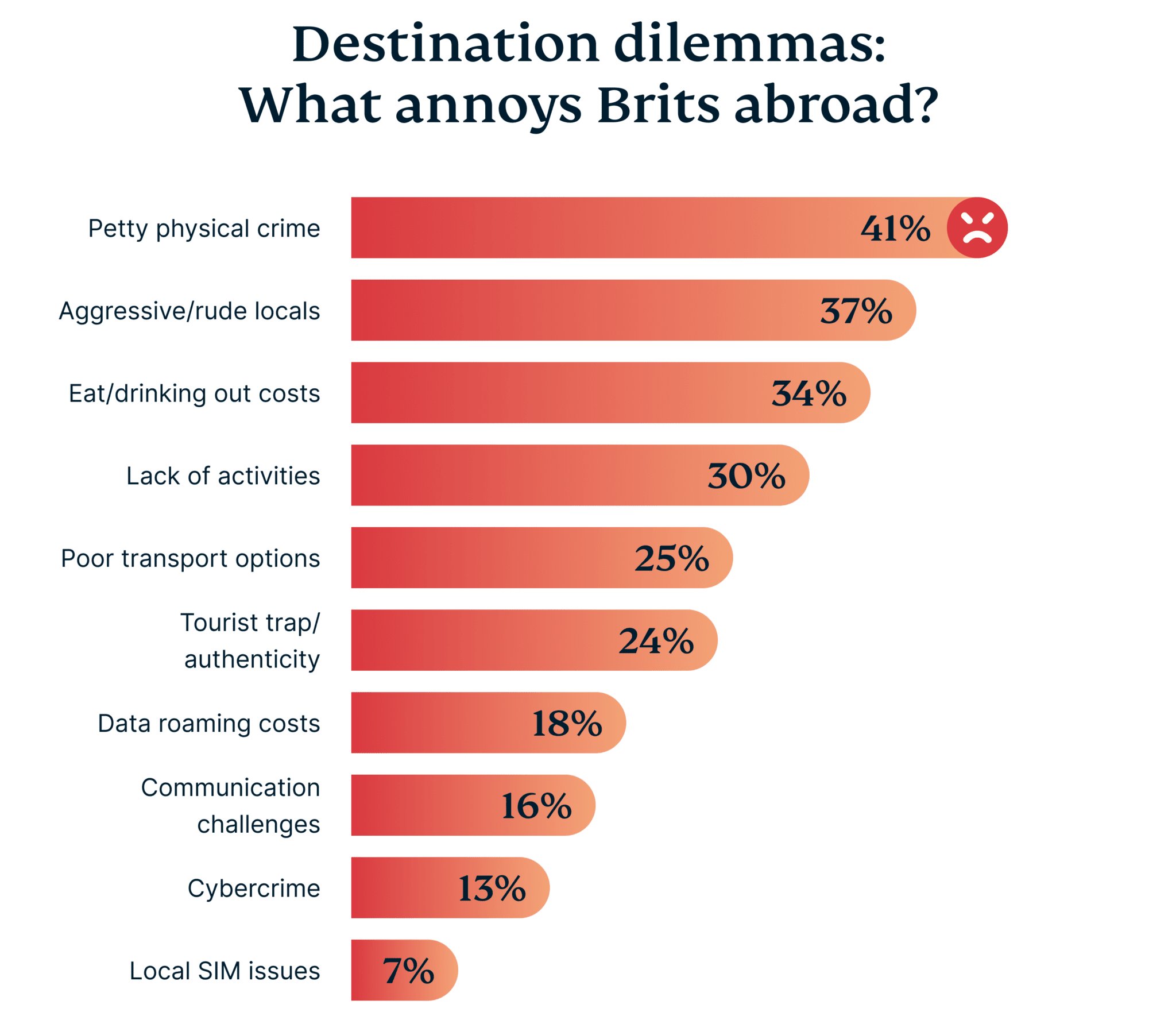
Attractions—or the lack thereof—also play a significant role, with 30% disappointed by the shortage of interesting things to do or visit while on holiday. Poor transport options and the feeling of being trapped in a tourist bubble without authentic experiences add to the gripes, cited by 25% and 24% of respondents, respectively. And, considering our constant need to connect, 18% are turned off by high data roaming charges, underscoring the importance of staying connected affordably.
The struggle for connectivity
Speaking of staying connected, Wi-Fi issues are another modern-day holiday headache. Frustrations begin mid-flight for 12% of travelers irked by the absence of onboard Wi-Fi, setting the stage for a journey where our digital expectations are immediately challenged. And the issue doesn't stop once they land. A significant 24% of holidaymakers report being vexed by slow or nonexistent Wi-Fi in their accommodations—a stark reminder of the importance we place on digital access, even in moments of relaxation.
Read more: How concerned are travelers about cybercrime during their vacations?
Wi-Fi’s role in UK holidaymaking
In fact, with up to 60% of Brits taking two or more mobile devices with them on holiday (including smartphones, laptops, iPads, tablets, and virtual assistants like Alexa), and a significant number using public Wi-Fi for activities ranging from social media access (43%) to general internet browsing (42%), it’s clear that staying connected is fast becoming an indispensable part of the UK holiday experience.
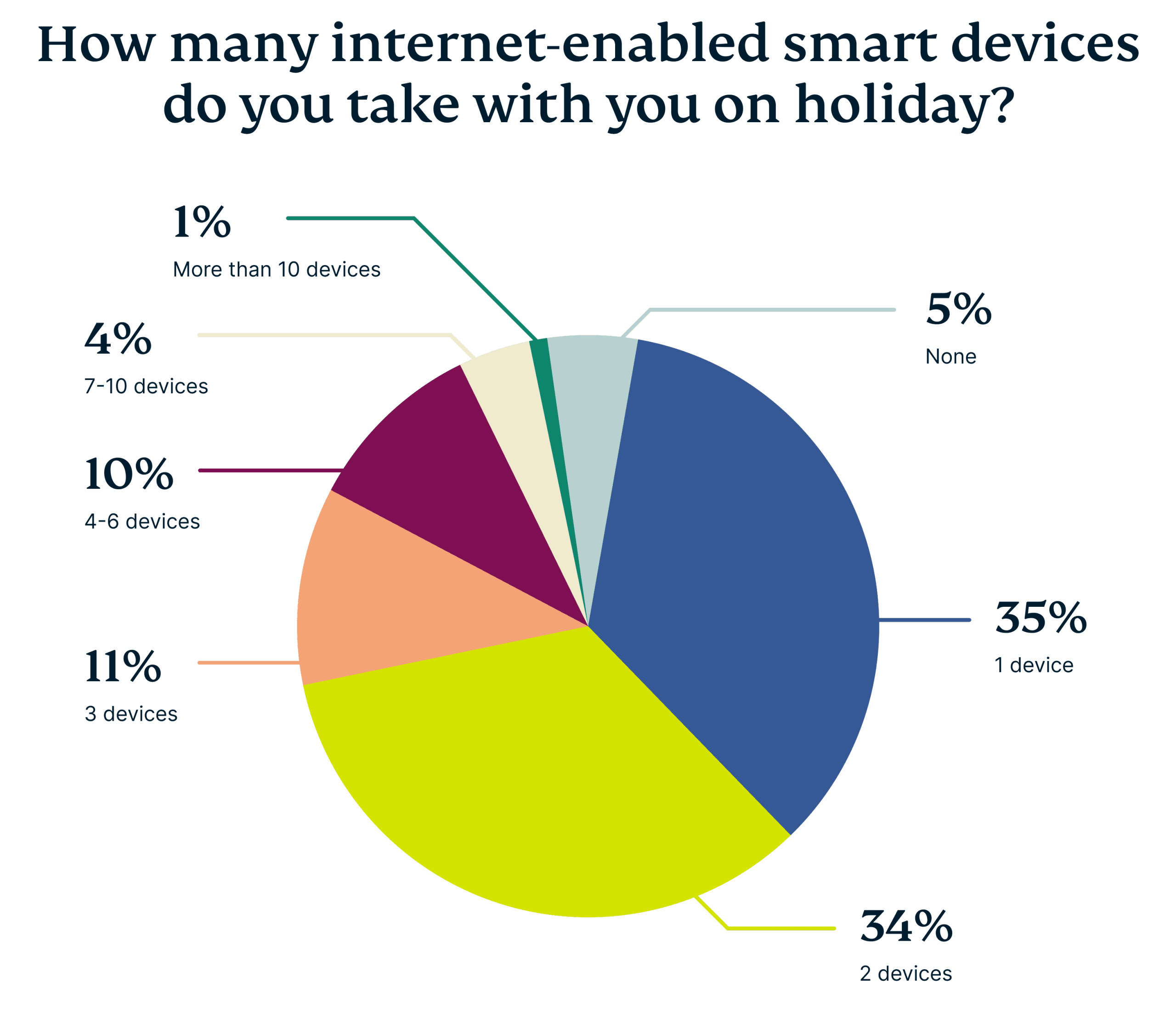
8% of Brits use Wi-Fi on holiday to access questionable content
While the majority of Brits tap into public Wi-Fi hotspots during holidays to stay in touch with loved ones (42%) or catch up on news (34%), conduct online banking (27%), or work (22%), a fraction engage in more precarious online activities. Notably, 3% of individuals use Wi-Fi for gambling or viewing adult content, and 2% for exploring the dark web.
What do you use Wi-Fi for when on holiday?
| Activity | Percentage |
| Accessing social media | 43% |
| Browsing the internet | 42% |
| Keeping in touch with friends and family | 42% |
| Reading the news | 34% |
| Online banking | 27% |
| To work or catch up on emails | 22% |
| Play games | 20% |
| Stream TV shows, movies, or sports | 20% |
| Online shopping | 13% |
| To keep my children occupied | 13% |
| To look up people I’ve met on holiday | 4% |
| Gambling | 3% |
| Watching pornography | 3% |
| Accessing the dark web | 2% |
Read more: 8 tips for online safety this travel season
Despite 62% of users expressing worry about their online activities being monitored on public Wi-Fi, and 13% citing cybercrime as a holiday concern, a large number continue to rely on these networks to stay connected.
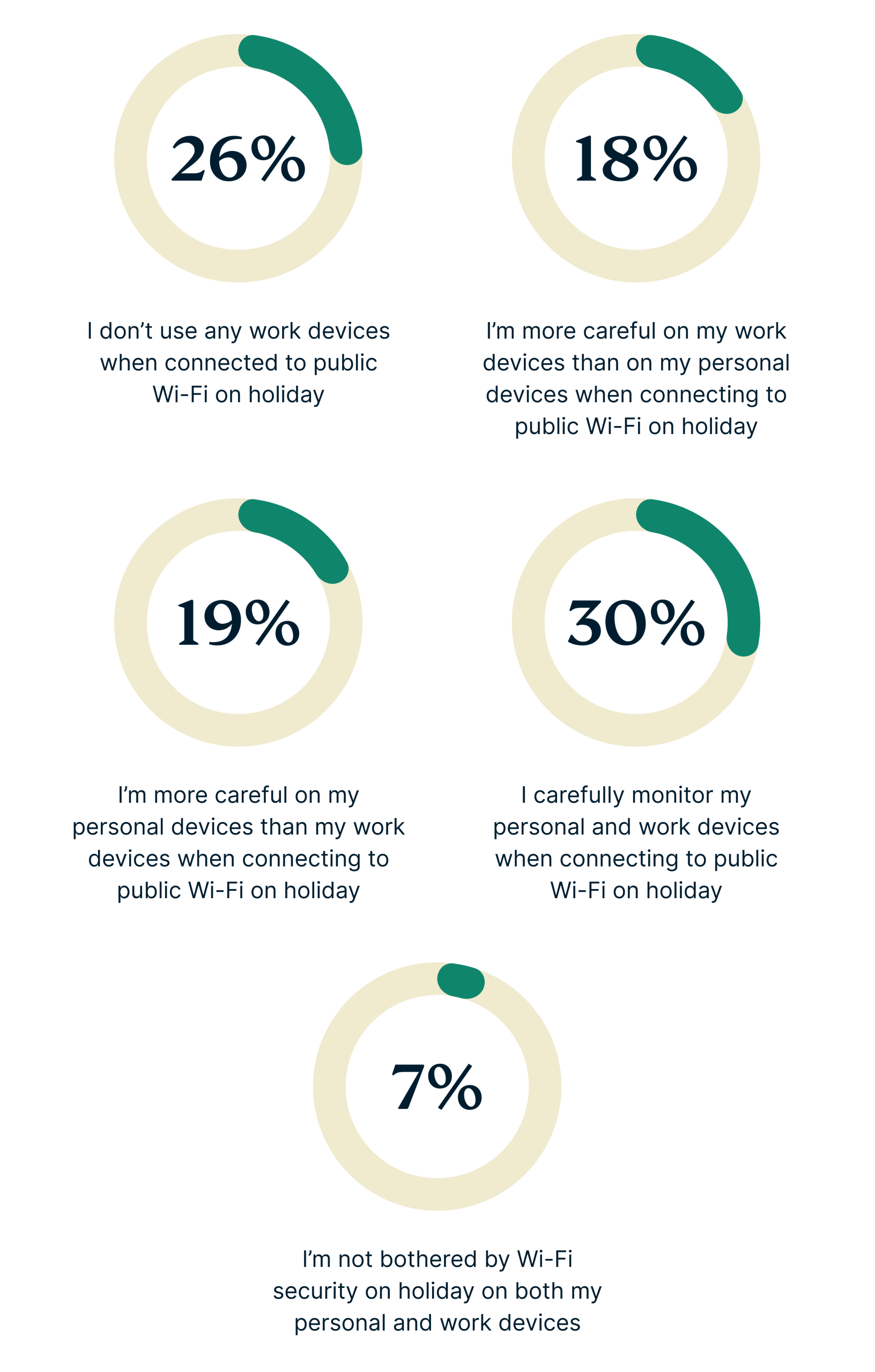
Although it's reassuring that 30% of travelers take extra security measures with their devices on public Wi-Fi, such as careful location selection or using VPNs, the fact that 7% disregard Wi-Fi security on both personal and work devices is alarming.
Here’s why.
The dangers of using public Wi-Fi
Using public Wi-Fi when you’re on vacation is a prime example of a convenience that comes with risks. Tourists use it everywhere—to get directions, to post on social media, or to check in with family. But each time you connect to a public network, you're potentially exposing yourself to cyber attacks.
Here are some of the ways your personal information can be compromised over public Wi-Fi networks:
- Evil-twin attack. With this method, criminals create a network with a similar name to the public network and gain direct access to the computer of any guests who accidentally connect to it.
- Man-in-the-middle attack. In man-in-the-middle attacks, a hacker secretly relays and possibly alters the communication between two parties who believe they are directly communicating with each other.
- Packet sniffing. This is where a hacker records the packets of data that pass between you and an unsecured Wi-Fi router.
- Snooping by Wi-Fi admin. Someone who oversees the network (such as hotel staff) could deduce what sites each guest has been visiting based on Wi-Fi logs.
All of the above risks can be mitigated by using a high-quality VPN on your device when you go online.
VPN: the easiest way to stay safe online on vacation
Connecting to public Wi-Fi is like a reflex for many of us while traveling. It's convenient, sure, but safe? Not so much. However, staying safe isn't about avoiding public Wi-Fi altogether; it's about how you use it.
Enter VPNs. Using a VPN on all your devices encrypts your internet connection, essentially scrambling the data so it becomes unreadable to anyone who might try to intercept it. This includes ISPs, the admins running the public Wi-Fi, governments, or man-in-the-middle attackers.
Now, let's talk about making VPN protection as seamless as possible, especially when you're on the move. ExpressVPN's Aircove Go is a travel router designed with your digital safety in mind. Imagine connecting to any Wi-Fi network anywhere in the world and having all your devices immediately covered by VPN protection. That's exactly what Aircove Go offers.
Other tips for protecting your privacy on holiday
On top of using a VPN when traveling, it’s important to find a balance between wanting to share those picture-perfect moments and keeping your private life, well, private. Here are some tips to keep your personal details a little more secure while traveling:
- Think before you share: Ask yourself if what you're about to post on social media could give away too much about your location or plans. It’s also wise to post after your trip.
- Avoid sharing live locations: Wait until you've moved on from a location before posting about it to prevent making yourself and your home vulnerable.
- Cover sensitive details: If sharing a photo of your boarding pass or travel documents, ensure personal details are obscured, or better yet, avoid sharing them at all.
- Beware shoulder surfers: You might have your guard down while traveling. But stay alert to people watching your screens while you enter passwords or read your emails. A privacy filter can make your screen look black when not viewed exactly head-on.
- Turn off your Wi-Fi and Bluetooth when not in use. This lessens the chance of connecting to a network or device when you didn’t intend to.
- Take caution with QR codes. There are malicious QR codes out there that could take you to a phishing site or worse.
Bonus: Enable “find my device”: Turning on location tracking for your device can help if it gets lost or stolen.
What’s your biggest holiday gripe? Let us know in the comments below.
Take the first step to protect yourself online. Try ExpressVPN risk-free.
Get ExpressVPN
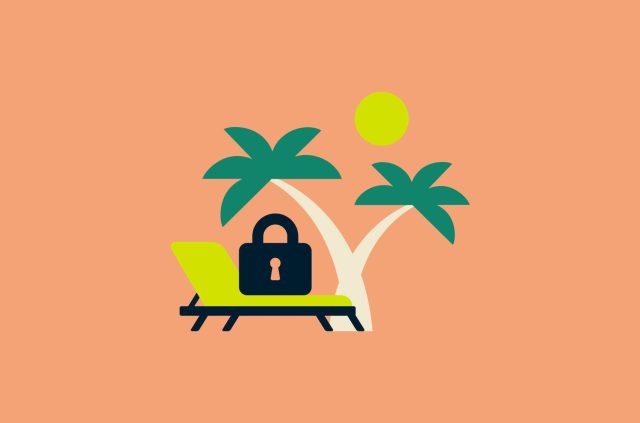

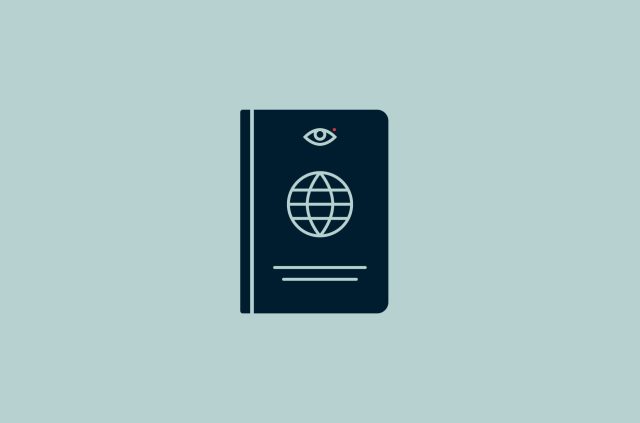

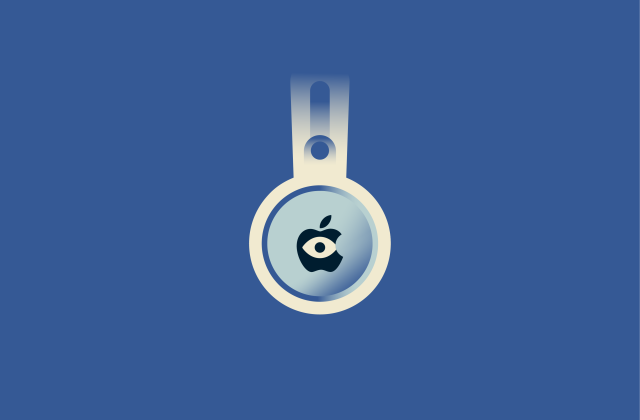

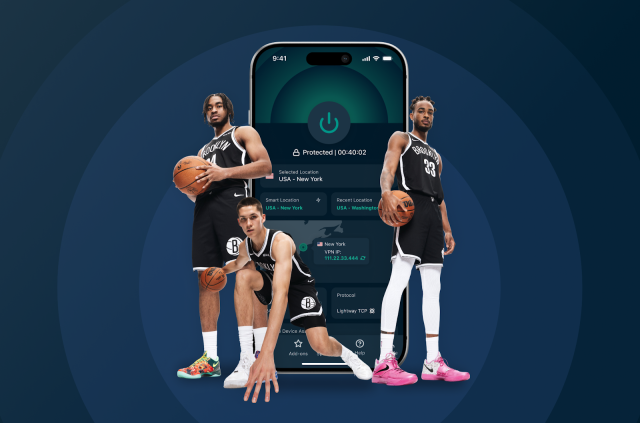
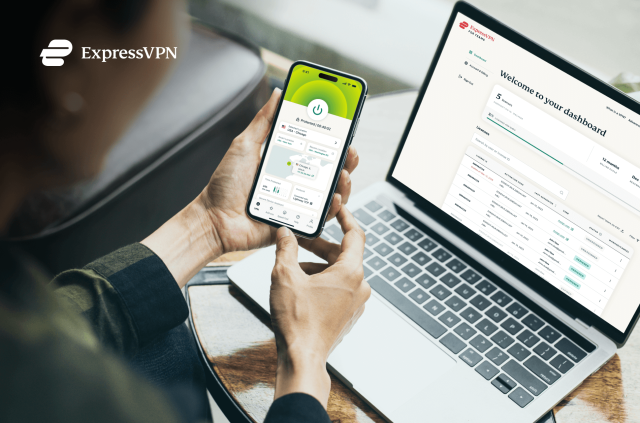










Comments
One thing that annoyed me intensely was that Tui's app won't work with a VPN so I had to turn it off to access my pre-checked-in boarding pass at the airport. I assume this is because the greedy so-and-sos charge more to passengers in some countries than others, so don't want you to be able to mask your location. This obviously defeats the object (albeit for a short time only) of having the VPN, which I keep on all the time.